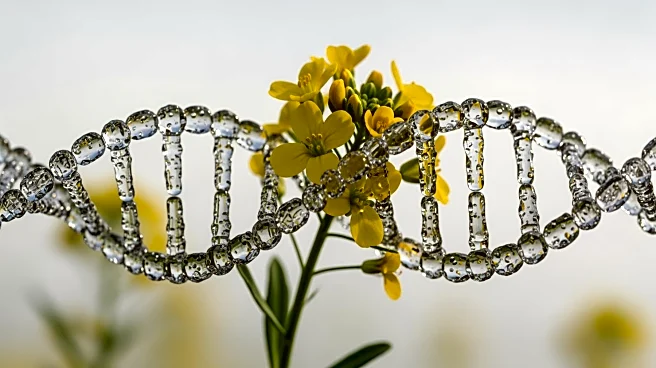What's Happening?
Recent research has uncovered the role of CDCA7 alleles in shaping CG methylation patterns in Arabidopsis thaliana. The study utilized genome-wide association studies (GWAS) to explore the genetic architecture of mCG variation, focusing on transposable
elements (TEs) in euchromatic and heterochromatic regions. The findings revealed that genetic variants of CDCA7α significantly influence mCG levels, contributing to phenotypic variation at cellular, individual, and population levels. The study identified CDCA7α as a trans regulator of mCG, with its expression variation strongly impacting the epigenome of natural populations. The research highlights the complex interplay between genetic, epigenetic, and cellular changes in shaping the epigenome.
Why It's Important?
Understanding the genetic factors that influence epigenomic variation is crucial for comprehending adaptive evolution and phenotypic diversity. The identification of CDCA7 alleles as key regulators of mCG levels provides insights into the mechanisms underlying epigenetic inheritance and its role in natural selection. This research has implications for plant breeding and conservation, as it highlights the potential for utilizing genetic variants to enhance desirable traits. Additionally, the study contributes to the broader understanding of how epigenomic variation can drive evolutionary processes and impact biodiversity.
What's Next?
Future research may focus on exploring the adaptive significance of CDCA7 alleles in different environmental contexts and their potential role in plant resilience. Investigating the interaction between CDCA7 and other genetic factors could provide further insights into the regulation of epigenomic variation. Additionally, the application of these findings in agricultural practices could lead to the development of crops with improved traits, such as stress tolerance and yield.
Beyond the Headlines
The study raises ethical considerations regarding the manipulation of genetic variants for agricultural purposes. While enhancing desirable traits can benefit food security, it is essential to consider the ecological impact and potential risks associated with altering natural genetic diversity. The research also underscores the importance of preserving genetic resources and understanding the evolutionary history of plant species.















